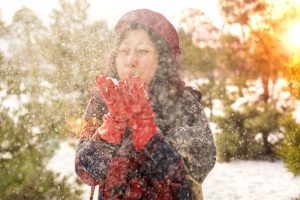When winter arrives in Texas, residents brace themselves not only for cooler weather but also for cedar fever. This seasonal allergy, caused by mountain cedar trees (Juniperus ashei), affects thousands of Texans each year. At Texas ENT & Allergy, we understand how disruptive cedar fever can be, and we’re here to help you navigate the season with effective strategies and personalized care.
What Is Cedar Fever?
Cedar fever isn’t an illness in the traditional sense, it’s an allergic reaction to the pollen released by mountain cedar trees. These trees, which are common in Central Texas, pollinate from December through February, releasing large amounts of pollen into the air.
Symptoms of cedar fever include:
- Sneezing
- Nasal congestion and runny nose
- Sinus pressure and headaches
- Itchy, watery eyes
- Fatigue and general discomfort
Although it’s called cedar fever, it rarely causes an actual fever. However, the symptoms can mimic those of a cold or flu, leading many to confuse cedar fever with an illness.
Tips for Managing Cedar Fever
- Monitor Pollen Counts:
Stay updated on daily pollen levels through reliable resources like Pollen.com or local weather apps. On days with high pollen counts, limit outdoor activities, especially in the morning when pollen levels are at their peak.
- Minimize Outdoor Exposure:
- If you need to be outside, wear a mask and sunglasses to reduce pollen contact.
- After being outdoors, shower and change clothes to remove pollen from your body and hair.
- Improve Indoor Air Quality:
- Use HEPA filters in your home to trap pollen and other allergens.
- Vacuum carpets and rugs frequently and wash bedding regularly.
- Hydrate and Stay Healthy:
Staying hydrated can help alleviate sinus congestion, while maintaining a healthy diet rich in anti-inflammatory foods may reduce allergy symptoms.
- Use Over-the-Counter Remedies:
Medications like antihistamines, decongestants, and saline nasal sprays can provide temporary relief. For best results, start using these products before cedar fever season begins.
Advanced Allergy Solutions at Texas ENT & Allergy
If cedar fever symptoms persist despite your efforts, it’s time to consult an ENT specialist. At Texas ENT & Allergy, we offer comprehensive care tailored to your needs, including:
- Allergy Testing:
We conduct skin or blood tests to identify your specific allergies and determine the best course of treatment.
- Immunotherapy:
Allergy shots or drops are a long-term solution designed to desensitize your immune system to cedar pollen and other allergens. According to the American Academy of Allergy, Asthma & Immunology (AAAAI), immunotherapy is a proven way to reduce allergy symptoms over time.
- Prescription Medications:
For severe cases, we may prescribe medications to help you manage symptoms effectively at home.
Why Choose Texas ENT & Allergy?
As your trusted ENT providers in the College Station, Brenham, Huntsville, and Waco communities, the Texas ENT & Allergy physician team is dedicated to delivering top-tier care for patients of all ages. With decades of experience and a commitment to the latest advancements in ENT care, our providers are uniquely equipped to help you overcome cedar fever and other pollen-based or environmental allergies.
Don’t let cedar fever control your winter. Contact Texas ENT & Allergy today to schedule your allergy consultation and take the first step toward relief.



